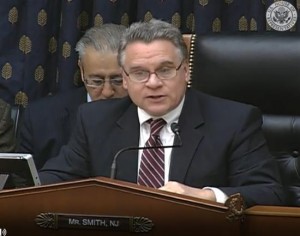Confucius Says: Congressman Smith Asks Too Many Questions
 Congressman Chris Smith, chairman of the global human rights subcommittee in the House of Representatives and co-chairman of the U.S. Commission on China, held a hearing on Thursday entitled, ““Is Academic Freedom Threatened by China’s Influence on U.S. Universities?”
Congressman Chris Smith, chairman of the global human rights subcommittee in the House of Representatives and co-chairman of the U.S. Commission on China, held a hearing on Thursday entitled, ““Is Academic Freedom Threatened by China’s Influence on U.S. Universities?”
At issue is a growing number of Chinese educational partnerships started by U.S. universities and colleges, including exchange programs and satellite campuses in China and China’s recent Confucius Institutes in the U.S.
An American Association of University Professors (AAUP) report issued in July alleges that the institutes “sacrificed the integrity of the [host] university and its academic staff” by requiring concessions “to advance a state agenda in the recruitment and control of academic staff, in the choice of curriculum, and in the restriction of debate.” The AAUP report concluded that “Confucius Institutes function as an arm of the Chinese state and are allowed to ignore academic freedom” and recommended shutting down U.S. Confucius Institutes unless they could meet certain standards of academic freedom and transparency.
“We are seeing emerging faculty opposition to these Institutes, as well as to the all-too cozy and lucrative arrangements which American universities have with institutions affiliated with the Chinese government,” said Smith, who has held nearly 50 congressional hearings on the Chinese government’s human rights abuses on freedom of speech, academic, religion, the press and other basic human rights. “This prompts us, however, to ask the question: Is American higher education for sale? And, if so, are U.S. colleges and universities undermining the principle of academic freedom – and, in the process, their credibility—in exchange for China’s education dollars?”
“While foreign educational partnerships are important endeavors—for students, collaborative research, cultural understanding, and even for the host country—I think we all can agree that U.S. colleges and universities should not be outsourcing academic control, faculty and student oversight, or curriculum to a foreign government.”
Chinese Foreign Ministry spokeswoman Hua Chunying responded to Smith’s hearing by saying that all Confucius Institutes in the United States had been voluntarily applied for by U.S. universities, according to Reuters.
“All class and cultural activities are open and transparent. The Chinese side has provided teachers and teaching materials assistance according to requests of the U.S. side. It has never interfered with academic freedom,” she told a daily news briefing.
“We hope everybody can make joint efforts to reject prejudice and work together to better build these bridges of friendship and make them stronger.”
Smith said he will ask the non-partisan Government Accountability Office to review the agreements of both satellite campuses in China and of Confucius Institutes in the U.S.
“I would like to know if those agreements are public, whether they compromise academic or other freedoms of faculty, students, and workers and whether Chinese teachers are allowed the freedom to worship as they please and teach about Tiananmen, Tibet, and Taiwan,” Smith said. “I will also ask the GAO to study whether U.S. satellite campuses in China operate differently from Chinese universities.”
Smith said he would ask the GAO report to include whether Communist Party committees operate on campus, and whether fundamental freedoms are protected for both Chinese and U.S. students and faculty—religious freedom, internet freedom, freedom of speech, freedom of association.










